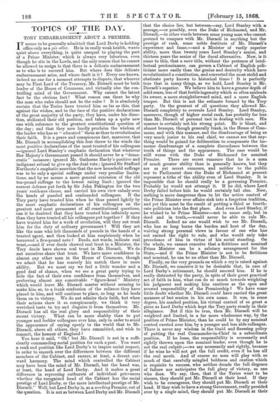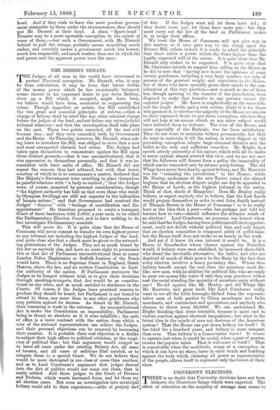TOPICS OF THE DAY.
TORY EMBARRASSMENT ABOUT A PREMIER.
IT seems to be generally admitted that Lord Derby is holding office only as a pis aller. He is in really weak health, wants quiet above everything, is quite unequal to playing the part of a Prime Minister, which is always very laborious, even though he sits in the Lords, and the only reason that he cannot be allowed to resign is that there is a delicate embarrassment as to who is to succeed him. But where does this delicate embarrassment arise, and whose fault is it? Every one knows, indeed no one for a moment attempts to dispute, that whoever may be First Lord of the Treasury, Mr. Disraeli must be both leader of the House of Commons, and virtually also the con- trolling mind of the Government. Why cannot the latent fact be the obvious fact? What reason can there be why the man who rules should not be the ruler ? It is absolutely certain that the Tories have trusted him so far as this, that against the wishes, and in the face of the positive declarations of the great majority of the party, they have, under his direc- tion, abdicated their old position, and taken up a quite new one with reference to the greatest constitutional question of the day ; and that they now loudly proclaim the wisdom of the leader who has so "educated" them as thus to revolutionize their faith. It is a grave and conspicuous fact, moreover, that Mr. Disraeli in accomplishing this feat threw to the winds the most positive declarations of the most trusted of his colleagues —ignored Lord Stanley's emphatic declaration that whatever Her Majesty's Government passed it should never be a "demo- cratic" measure; ignored Mr. Gathorne Hardy's positive and indignant refusal to give up the dual vote ; ignored Sir Stafford Northcote's emphatic assertion that the new household suffrage was to be only a special suffrage under very peculiar limita- tions, and by no means a mere general extension of the old ten-pound suffrage to the lowest rating limit ; ignored the earnest defence put forth by Sir John Pakington for the two years' residence clause, and carried his own view calmly over the heads of puzzled and confounded colleagues. If the Tory party have trusted him when he thus passed lightly by the most emphatic declarations of his colleagues on the greatest and most permanent of all constitutional questions, can it be doubted that they have trusted him infinitely more than they have trusted all his colleagues put together ? If they have trusted him for a work of revolution, will they not trust him for the duty of ordinary government ? Will they act like the man who left thousands of pounds in the hands of a trusted agent, and then looked at him suspiciously when he borrowed a five-pound note ? Deeds, not words, indicate real trust,—and if ever deeds showed real trust in a Minister, the Tory deeds have shown real trust in Mr. Disraeli. We do not ourselves share that trust. We have more confidence in almost any other man in the House of Commons, though we admit that he has scarcely his match there in mere ability. But we must say we feel a little wonder and a good deal of shame, when we see a great party trying to hide the fact of their own confidence from themselves, and preferring almost any conceivable " figure-head " Ministry which would leave Mr. Disraeli master without seeming to make him so, to a frank confession of the reliance they have placed in him, and will continue to place, so long as he leads them on to victory. We do not admire their faith, but when their actions show it so conspicuously, we think it very wretched taste to try and disguise it from themselves. Mr. Disraeli has all the real glory and responsibility of their recent victory. What can be more shabby than to put younger and feebler colleagues over him, only in order to avoid the appearance of saying openly to the world that to Mr. Disraeli, above all others, they have committed, and wish to commit, the honour of England ?
You hear it said, "Oh! but Mr. Disraeli is not in a suffi- ciently commanding social position for such a post. You want a rank and position like Lord Derby's to inspire social respect, in order to smooth over the differences between the different members of the Cabinet, and ensure, at least, a decent out- ward harmony. The mind which controlled the Cabinet may have been the mind of Mr. Disraeli, but the hand was, at least, the hand of Lord Derby. And it makes a great difference in repressing outbursts of individual grievances whether the recognized head of the Cabinet has the social prestige of Lord Derby, or the mere intellectual prestige of Mr. Disraeli." Well, but Lord Derby is, as a working Premier, out of the question. It is not as between Lord Derby and Mr. Disraeli that the choice lies, but between—say, Lord Stanley with a. peerage,—or possibly, even the Duke of Richmond, and Mr.. Disraeli,—in other words between some young man who cannot. pretend to compare with Mr. Disraeli in anything but the prestige of rank, some noble destitute of Mr. Disraeli's. experience and fame,—and a Minister of vastly superior ability, more than twenty years Lord Stanley's senior, and. thirteen years the senior of the ducal alternative. Now, is it. come to this, that a mere title, without the pretence of intel- lectual predominance, can govern a Cabinet of English poli- ticians more easily than the genius and dexterity which have. revolutionized a constitution, and converted the most stolid and obstinate party known to historical times ? It is perfectly true that in many things, as we hold, Lord Stanley is Mr. Disraeli's superior. We believe him to have a greater depth of solid sense, less of that fertile ingenuity which so often misleads. its owner, a more straightforward mind, and a more English temper. But this is not the estimate formed by the Tory, party. On the greatest of all questions they allowed Mr.. Disraelicompletely to overrule Lord Stanley. Lord Stanley,. moreover, though of higher social rank, has probably far less. than Mr. Disraeli of personal tact in dealing with men. His manner is certainly not his strong point. He is blunt, and almost brusque, though generally frank, in the House of Com- mons, and with this manner, and the disadvantage of being so very much junior to his real chief, we cannot see that any- thing would be gained for deliberation to compensate the im- mense disadvantage of a complete discordance between the truth of things and the appearance. The case would be still worse with the Duke of Richmond for nominal. Premier. There are secret rumours that he is a man. of much greater ability than is generally known, but they are as yet secret rumours, and neither to the public. nor to Parliament does the Duke of Richmond at present. represent a tithe of the ability even of Lord Stanley. It is impossible that he should really be a governing Premier._ Probably he would not attempt it. If he did, where Lord Derby failed before hifiL he would certainly fail also. Now, nothing is more dangerous than to let the active control of the Prime Minister over affairs sink into a forgotten tradition,. and yet this must be the result of putting a third or fourth- rate politician into the first place. And even Lord Stanley, if he wished to be Prime Minister—not in name only, but ia deed and in truth,—would never be able to rule Mr.. Disraeli. Indeed no one would wish to see Mr. Disraeli,. who has so long borne the burden and heat of the day, waiving strong personal views in favour of one who has not earned the right to rule, and who would only take precedence of him in virtue of his social standing. On the whole, we cannot conceive that a fictitious and nominal Prime Minister can be a salutary arrangement for the State,—and if the Prime Minister is not to be fictitious. and nominal, he can be no other than Mr. Disraeli.
Finally, on the very grounds on which a cry is raised against Mr. Disraeli, we conceive it to be desirable that, in case of Lord Derby's retirement, he should succeed him. If he is really distrusted by the party, in spite of their great practical act of faith in him, what can do so much towards weighting his judgment and making him cautious as the open and avowed responsibility of the Premiership ? We have some little doubt whether Mr. Disraeli could have carried the great measure of last session in his own name. It was, in some degree, his masked position, his virtual control of so great a piece as Lord Derby which kept the Tory party steady in their allegiance. But if this be true, then Mr. Disraeli will be weighted and limited, in a far more wholesome way, by the position of Prime Minister, than he could be by any nominal control exerted over him by a younger and less able colleague. There is never any wisdom in the timid and finessing policy of putting the real Commander-in-Chief in a subordinate position. If he loses, the responsibility is necessarily and rightly thrown upon the nominal leader, even though he is not the real culprit ;—we say necessarily and rightly, because if he wins he will not get the full credit, even if he has all the real merit. And of course no man will play with so much of that carefully mingled boldness and caution which is requisite to success, who neither dreads the full disgrace of failure nor anticipates the full glory of victory, as one who does. We say, then, that if the Tories want to be sincere, they should put Mr. Disraeli at their head. If they wish to be courageous, they should put Mr. Disraeli at their head. If they wish to have a strong Government, really presided over by a single mind, they should put Mr. Disraeli at their
head. And if they wish to have the most prudent govern- ment attainable by them under the circumstances, they should put Mr. Disraeli at their head. A sham " figure-head " Premier may be a more agreeable conception to the minds of some of them ;—but such a Government, with Mr. Disraeli behind to pull the strings, probably means something much rasher, and certainly means a government much less honest, much less responsible, and much weaker, than one in which the real power and the apparent power were the same.































 Previous page
Previous page